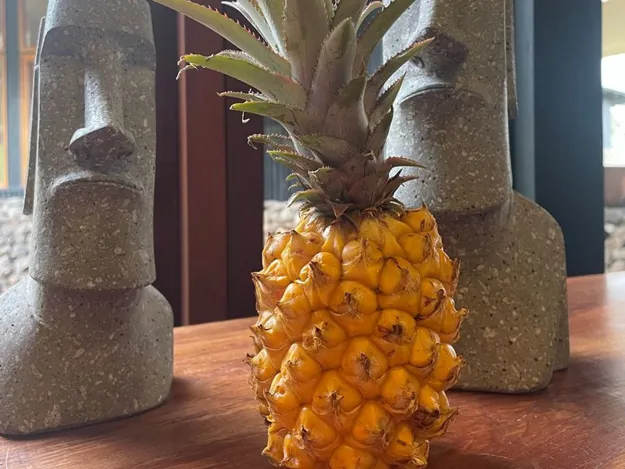Consumers in some world markets could soon be enjoying pineapples grown on Easter Island, in the middle of the Pacific Ocean. The island with almost 8,000 inhabitants is situated about 3,700 km from Chile and almost 4,000 km from Tahiti. This is the dream of the Zacarias family business called Ohiva Rapanui according to Nilse Patuelli who are proud of the Queen pineapples grown on this remote island.

The island is a special territory of Chile, in the southeastern Pacific Ocean. Its native name is Rapanui, known for moai, which are carved human figures with oversize heads, often resting on massive stone pedestals.
“This island stands out for having a fascinating archaeological heritage, for a lively culture that evokes their ancestors. In this place, the sweetest and juiciest pineapples that can be found in the market are harvested, as well as being a beekeeping sanctuary. This is a pineapple cultivation project, of the Queen variety, one of the oldest known varieties. Around four hectares have already been planted and bee hives installed to help pollination and thanks to the fact that Rapanui has a subtropical climate rainwater is responsible for irrigation. Zacarias's family started the plantation about eight years ago, which has grown over the years. It should be noted that it is a plant that takes several years to grow before bearing fruit,” explains Patuelli.

She says Easter Island is “a place without equal”, with the entire island a national park. “There cannot be large proportions of planted land, since archaeological remains can be found in all parts of the island. It has an ideal climate for the cultivation of this fruit and many more since it rains a lot, has many hours of light, high humidity and heat. The Agricultural Livestock Service is very present in the control of pests on the island, so that there is no irrigation at the time of consuming the fruits, there is a high concern that this control is not altered.”
Pineapple exports to expand
Pineapples have been grown on the island and sent to mainland Chile. However, this is likely to change says Patuelli, who also farm with honey. “We have been sending pineapples to continental Chile by plane for two seasons, the harvest takes place in the months of January to March, with limited production both for us and for small local pineapple farmers. The price of the pineapples varies according to the size and the boxes are over 10 kilos. The honey in glass jar format from 200 grams. It is an incipient project, in which we have become known through Instagram and our clients have been mainly within the national territory. We have many dreams, within this is to reach large supermarkets both in Chile and worldwide. We have been in conversations to reach an important international brand retailer, which we are working on to reach an agreement and of course we would love to reach Europe with our flavours.”

Island challenges
Ohiva Rapanui stands out for having sustainable practices within both production and marketing processes says Patuelli. “Within the territory, the local authority gave us a seal called Tapao Rito Mata (green seal) by using rainwater for irrigation, applying the circular economy in the collection of fruit packaging boxes, the one-by-one inspection of the pineapples by part of the agricultural livestock service so that its shipment to the continent can be authorized, and to help the planet with plantations and promoting food security. One of our challenges on the island ranges from continuing with the plantations of this fruit and in the future building a food processing plant, to have a frozen format, other processed ones, dehydrated honey and who knows maybe how to start an experience tour in the pineapple field to those who visit Rapanui.”
For more information:
Nilse Patuelli
Ohiva Rapanui
Tel: +56 966 124 344
Email: primigenio.cl@gmail.com
